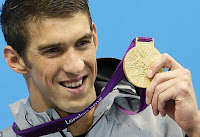Hey guys, post number two! Here it goes.
 But the main
question is... Do our genetics make a difference? Simple answer. Yes. Our
genetics play a huge role in defining our futures. If you put it this way,
you're either born an Olympic Champion or you're not. Now that's not to say
there's no in between, of course there is! But to be an Olympic champion you
can thank your genetics. In short that is, obviously victory doesn't just come
that easy. A favorable genetic profile combined with natural skill and hard
work and dedication is what makes a champion. But you need all three to be the
best. Not very many genes are consistently linked with elite athlete
performance but we still rely on our genes. And for those of you wondering,
these genes, which aid athletic performance stem from our mother not our father
so make sure you thank your mum when you become Olympic champion! Science
itself has discovered the role genetics play in elite athlete performance.
Genetic testing can be carried out in which we are tested for certain genes and
this will tell us if we have the right genes to contribute to athletic
performance. Genetic testing, however, isn't all that useful in identifying
talent from a group of people. Although genetics play a huge role in defining our future, they don't control our life and we can still make what we want of it.
But the main
question is... Do our genetics make a difference? Simple answer. Yes. Our
genetics play a huge role in defining our futures. If you put it this way,
you're either born an Olympic Champion or you're not. Now that's not to say
there's no in between, of course there is! But to be an Olympic champion you
can thank your genetics. In short that is, obviously victory doesn't just come
that easy. A favorable genetic profile combined with natural skill and hard
work and dedication is what makes a champion. But you need all three to be the
best. Not very many genes are consistently linked with elite athlete
performance but we still rely on our genes. And for those of you wondering,
these genes, which aid athletic performance stem from our mother not our father
so make sure you thank your mum when you become Olympic champion! Science
itself has discovered the role genetics play in elite athlete performance.
Genetic testing can be carried out in which we are tested for certain genes and
this will tell us if we have the right genes to contribute to athletic
performance. Genetic testing, however, isn't all that useful in identifying
talent from a group of people. Although genetics play a huge role in defining our future, they don't control our life and we can still make what we want of it.
To conclude,
genetics do make a difference but aren't the sole factor in defining a
champion. Genes play a role in athletic performance only if accompanied by the
correct training environment and hard work ethic put in by the individual. Michael Phelps is a brilliant example. He trained and trained and trained and all his hard work, along with his natural skill allowed him to be Olympic Champion. So
my advice to you is to work hard and prove you can be the best, no one is
stopping you after all! So work hard and put that skill you were given to good
use. Follow your dreams! Live the life you want.
I hope this post was
somewhat interesting to you guys and that you took something from it. If you
have any questions you want answered feel free to leave a comment and I'll try
answer in future posts. Thanks guys!

Comments